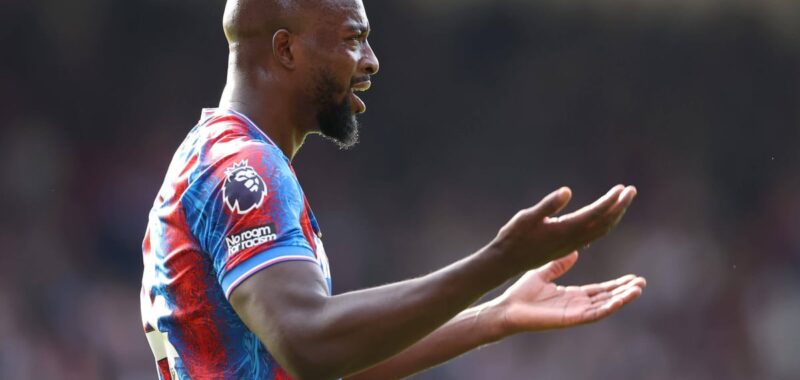If the boos which greeted the half-time whistle were for referee Tony Harrington, then there was no mistaking the direction of the moans and groans around Selhurst Park in the first half of Crystal Palace’s 2-2 draw with Leicester City.
Harrington had drawn the ire of Palace supporters in added time for blocking Cheick Doucoure from reaching a ball in midfield — he held his hands up in apology but Leicester had been helped in attack, even if it ultimately came to nothing.
That it is difficult to determine whether the complaints at the break were for him or the Palace side speaks to the sluggish performance from Oliver Glasner’s side. Throughout the opening 45 minutes and into the second half where Palace were admittedly improved, there were frequent exasperated shouts and groans to move the ball forward more quickly.
It is not, though, an isolated case. The same thing has happened in each of Palace’s opening four Premier League games. Their season opener against Brentford showed them up for being too ponderous at times, and that continued into the 2-0 defeat by West Ham United and the first half at Stamford Bridge in a 1-1 draw with Chelsea.
Too often decisions are made slowly enough to afford the opposition to neuter attacks, the ball is stuck in midfield and without more pace in the No 10 positions, there is not enough to stretch opposition defences on the counter-attack.

Palace are slowly being brought back down to earth after last season’s swashbuckling finish. They have laboured in taking two points from four games, struggling to find their rhythm or produce the same intensity that blew teams away in a run of six wins from their final seven games.
Glasner’s sides may tend to start the season slowly, and the overhaul of the summer where 10 players left and seven arrived adds context, but performances, while not disastrous or dreadful, have struggled to reach the levels that were expected. That may in part be a result of heightened expectations.
Yet the familiarity and speed of thought that contributed to their approach last season is missing. It is easy to point to the absence of Michael Olise as a contributory factor (and it clearly is), but this is more than that. Their play had more zip all over the pitch and they were quicker in transition.
Particularly in the first half against Leicester, their decision-making was slow in the midfield, with Eberechi Eze not releasing the ball quickly enough and Adam Wharton uncharacteristically below par. With five minutes played, Eze received the ball in space on halfway and Tyrick Mitchell had made a run to be free on the left. But Eze took time to decide and turned away with the opportunity to create something gone.

Against Brentford, there was a notable lack of intensity, too. The same was true of much of the West Ham defeat and very notable in the first half against Chelsea before their improvement after the break.
The crowd in all of those games became frustrated as the ball was stuck in midfield. Options have been lacking and the failure to progress as much has put pressure on an unfamiliar defence which has conceded the overwhelming majority of their goals this season on the counter-attack. Preventable goals, for the most part.
Leicester manager Steve Cooper summed it up. Despite that improvement with sustained pressure, there was still something missing.
“Palace chucked everything at us (but) I never felt like a goal was coming,” he said, even if it did courtesy of Conor Coady’s heavy touch and Ismaila Sarr’s quick thinking to win the penalty converted by Jean-Phillippe Mateta. ‘Everything’ included a slightly slapdash approach with Sarr and Jeffrey Schlupp as wing-backs and a switch to a back four.

Jean-Phillippe Mateta rescued a point from the penalty spot (Photo by Richard Heathcote/Getty Images)
Those are mitigating circumstances — there has been a lot of change. Glasner agreed his side needs to “find its rhythm” but also that they need to “create a common way of playing”.
“It’s new players,” he said. “Marc (Guehi) was injured at the end of the season, he trained with us for three weeks and trained more with England than Palace. He played in a new position in a back three then we switched to a back four. We went all in but you can see the players accept a role they are not used to. It’s our job to analyse this to get more stable. In possession, we had some great passing, we switched sides, we had overloads, we had many balls in the box.”
It would be unfair to hold them to the highest standards of those eight games, and there is still something to be said for finding a way to take points even when performances lack that consistency, but Palace must find a way to regain the smoothness of their play from last season.
Glasner told his players during the week that this was like a restart of the season with everyone available in training for the first time, but this felt more like a continuation of the issues from their previous three games. The Palace manager will hope that next weekend’s game — at home to Manchester United — is the fresh start he is looking for.
(Header photo: Richard Heathcote/Getty Images)

